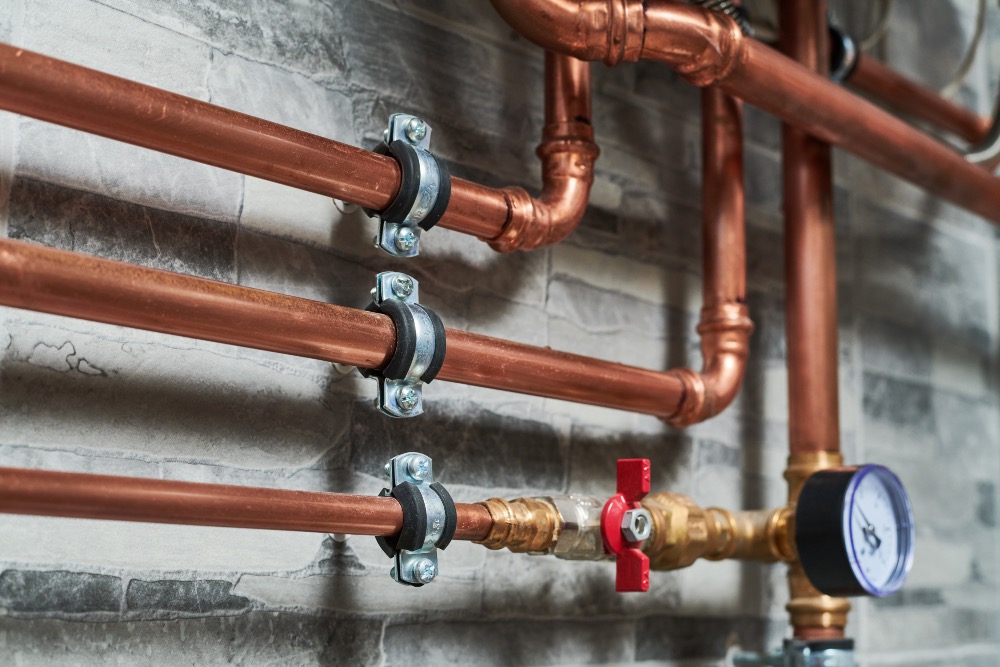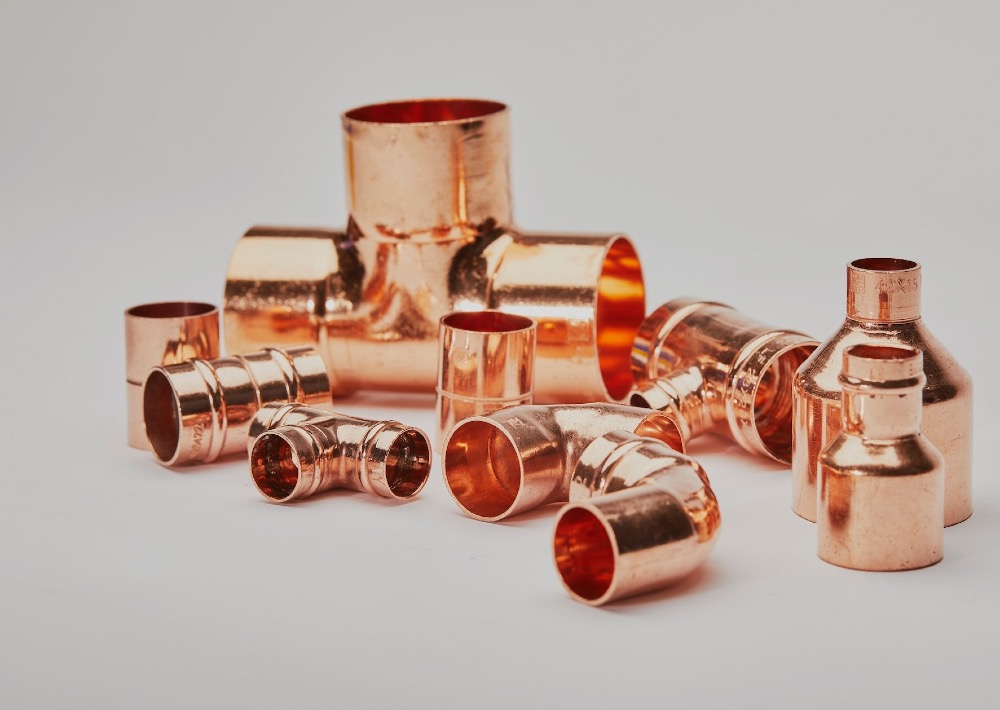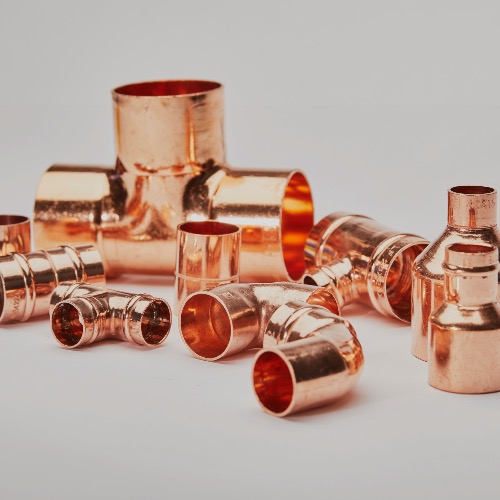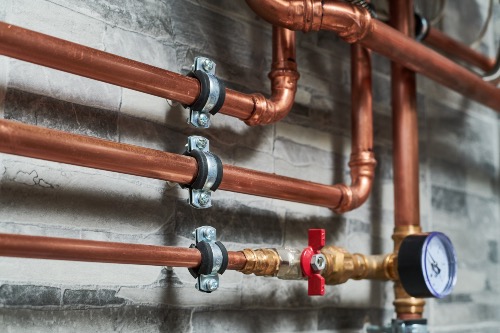Last Updated: Thursday, 29th February 2024
Copper Press vs. Soldering: Which is the Better Choice for Your Plumbing Needs?
When it comes to plumbing, the integrity of pipe connections is non-negotiable. Two popular methods stand out in the industry: copper press fittings and traditional soldering. Each has its proponents and detractors, but which one is the best fit for your project? This article delves into the nuances of both to help you make an informed decision.
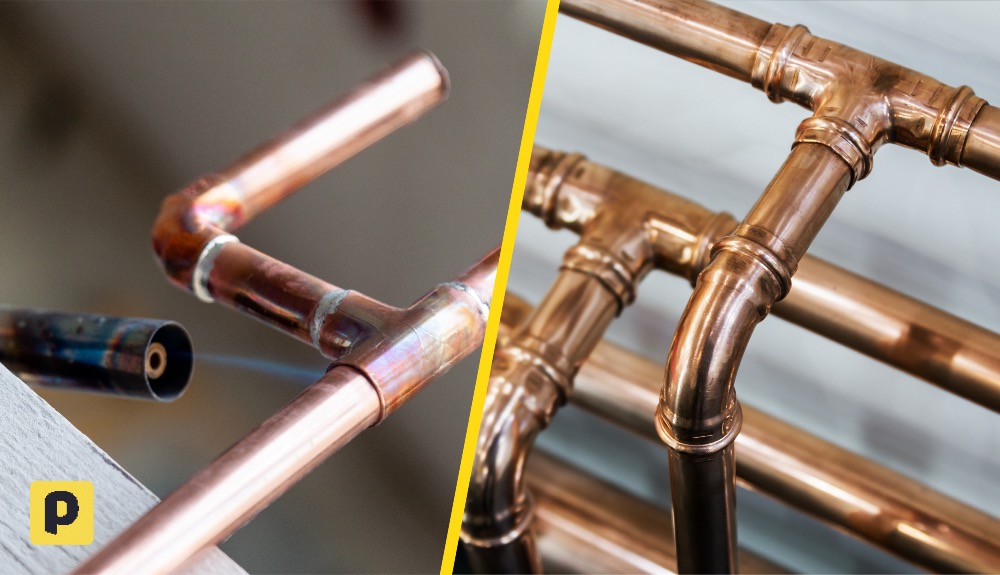
Understanding Copper Press Fittings
Copper press fittings represent a modern method in plumbing, offering a quick, clean, and efficient way to join copper pipes. This method involves attaching fittings to a pipe using a special press tool that crimps the fitting and pipe together, creating a watertight seal together with a gasket.
Advantages
Speed of Installation
Unlike traditional methods, copper press fittings can be installed in a fraction of the time, significantly speeding up project timelines.Low Skill Level
Again, unlike traditional methods, copper press fittings can be installed relatively easily and generally require much less training than other traditional methods using flames and capillary action.No Flame Required
This method eliminates the need for an open flame, reducing fire risk and making it safer, especially in enclosed spaces. This is really important for modern construction sites, where often, anything that produces a flame is strictly prohibited or requires extensive safety measures and paperwork.Reliability
Like all other types of plumbing fittings, Copper Press provides a consistent, leak-free connections that can withstand high pressure and temperatures.
Disadvantages
Initial Investment
The upfront cost for the press tool can be higher than traditional methods and can rule out DIY and Home Owner applications. Generally, Copper Press is used in commercial applications where plumbing needs to be done at scale.
Understanding Soldering
Soldering is a traditional method used in plumbing for generations, involving the use of solder to join copper pipes and fittings together through capillary action after heating them with a torch.
Advantages
Cost-Effectiveness
Soldering materials and tools are much less expensive than those required for press fitting.Strength of Bond
Traditional soldering methods have been used for generations. When done correctly, soldered joints are strong and can last for many, many years.
Disadvantages
Skill Level
The process is much more technical and requires training and experience to make sure that you have made the joint correctly.Time-Consuming
The process is slower and requires more preparation and cleanup time.Health and Safety Risks
The use of an open flame and exposure to lead-based solder can pose significant health and safety risks.
Comparative Analysis
When deciding between copper press fittings and soldering, consider the following factors:
Size of your Installation
Press fittings are significantly faster to install than soldered joints and can save significantly on labour costs for large projects. However, the tooling is very expensive, and so is generally not worth it for smaller projects and DIY applications.Skill Level Required
Soldering requires more skill and training to ensure a reliable bond, however it is not beyond the capability of confident DIYers.Equipment and Safety
Press fitting requires an initial investment in a press tool, but it eliminates the risks associated with open flames and toxic fumes. Traditional Copper Fittings require a naked flame to make the joint, which can be a significant safety risk.Longevity and Durability
Both methods, when executed correctly, offer durable solutions, but the longevity can vary based on the environment and application.
Making the Right Choice for Your Needs
The best choice depends on your specific situation:
Project Size and Scope
For large-scale projects or in tight spaces, copper press fittings can save time and reduce complexity.Budget
If initial costs are a concern, traditional Copper Fittings with soldering methods might be more economical.Skill Level
If you or your team are not trained in soldering, copper press fittings offer a simpler, safer alternative.Regulations and Standards
Always adhere to local building codes and standards, which may favour one method over the other.
Conclusion
Both Copper Press Fittings and traditional methods involving soldering have their place in plumbing, each with distinct advantages and drawbacks. By considering factors such as project scope, budget, skill level, and safety, you can choose the method that best suits your needs.
Remember, the right choice not only ensures a successful plumbing project but also contributes to the overall safety, efficiency, and longevity of your piping system.
Frequently asked questions
What are Copper Press Fittings?
Copper Press Fittings are modern plumbing components used to connect copper pipes together. They require a special tool to press the fittings onto the pipe, which together with a gasket create a watertight seal without the need for soldering.
How long does it take to install Copper Press Fittings compared to soldering?
Copper Press Fittings can be installed significantly faster than soldered joints. While soldering requires extensive preparation and cooling time, press fittings can be completed in a fraction of the time.
Are Copper Press Fittings as reliable as soldered connections?
Yes, like all plumbing fittings, when installed correctly, Copper Press Fittings are very reliable and can withstand high pressure and temperatures, similar to soldered connections.
Can Copper Press Fittings be used for all types of plumbing projects?
Copper press fittings are versatile and can be used for most plumbing projects, especially in commercial settings. However, the costs for the tooling may rule them out for smaller or DIY projects.
What are the main advantages of Traditional Soldering over Copper Press Fittings?
Soldering is more cost-effective and has been a reliable method for generations. It's suitable for a wide range of projects, especially smaller or DIY ones, and most of all, doesn't require expensive tools.
Are there any health and safety concerns with using Copper Press Fittings?
No. In fact, Copper Press Fittings are generally safer to use as they do not require an open flame or exposure to potentially harmful fumes, unlike soldering.
How do I decide whether to use Copper Press Fittings or soldering methods for my project?
Consider the size and scope of your project, your budget, your skill level, and the specific requirements of your plumbing system. Large-scale projects may benefit more from the speed and safety of Copper Press Fittings, while smaller or budget-conscious projects might be better suited to soldering.
Can Copper Press Fittings be used with all types of copper pipes?
Copper press fittings are compatible with most types of copper pipes, but it's important to check the specifications of the fittings and pipes to ensure compatibility. Generally speaking, Copper Press Fittings made to BS EN 1254-7 work with BS EN 1057 Copper Pipe.
Any more questions?
If you have any queries or questions about the products we sell, or even your next project, give us a shout! We'll try our best to give you a hand.
